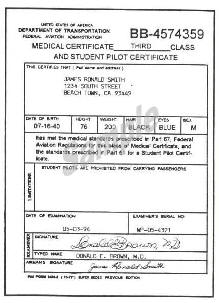|
|||||||||||||||||
|
|
|
|||
|
By Daniel Guevarra |
||||
 |
February 24, 2010 - Stanmore Cawthon Cooper, a pilot with AIDS, claimed
to have sustained damages as the result of an interagency exchange of
information performed as part of a joint criminal investigation by
Defendants Federal Aviation Administration (FAA), Social Security
Administration (SSA), and Department of Transportation (DOT).
After 911, when a series of coordinated suicide attacks by Al-Qaeda
hijacked four commercial passenger jets and intentionally crashed two of
the jets into the One the areas the feds began looking into, beginning in 1992, was a review of pilots who had made disability claims with the Social Security Administration. The feds were interested in identifying those pilots who had used different doctors, one to certify fitness to fly and another to certify disability for SSA benefits. This was a coordinated effort between the Department of Transportation, the Social Security Administration and the Federal Aviation Administration. |
|||
|
Stanmore Cooper learned he was HIV/AIDS positive and at the time he
was an active FAA licensed pilot. Prior to testing and unaware he
had acquired the virus, Cooper began to succumb to opportunistic
infections. He developed Peripheral Neuropathy, a condition caused
by nerve damage which is an area that carries information to and
from the brain and spinal cord. In many cases, Peripheral Neuropathy
symptoms improve with time, especially if it's caused by an
underlying condition that can be treated.
Human Immunodeficiency Virus (HIV) is a lentivirus (a member of the
retrovirus family) that causes Acquired Immunodeficiency Syndrome
(AIDS), a condition in humans in which the immune system begins to
fail, leading to life threatening opportunistic infections if
untreated.
Cooper began to experience those conditions associated with
Peripheral Neuropathy, such as loss of sensation, pain and an
inability to control muscles. Cooper under went an extensive medical
exam, he learned that he was HIV/AIDS positive and that he was
suffering from Peripheral Neuropathy. Cooper was placed on HIV
medication. Cooper?s medical condition began to deteriorate, typically it takes a while before the benefits of the medication begins to shows positive results. Cooper sought medical and financial relief. He applied to the Social Security Administration and began receiving disability benefits. |
||||
|
Cooper continued with his regiment of HVI medications and over the
years, Cooper's T-Cells increased dramatically and he found himself able
to go back to work. Cooper notified the Social Security Administration
he was no longer in need of benefits and was going back to work.
In 1998, itching to fly again as a private pilot, Cooper applied for a
new third class airman?s medical certificate. He competed the required
forms and passed the physical, and again applied in 2000, 2002, and
2004, and again passed the physicals. However, Cooper failed to report
on the medical forms for all four years his HIV status and that was on HIV medication, although he did report he was on Lipitor.
By failing to report his HIV status and HIV medication, Cooper was in
violation of the Federal Aviation Administration?s regulations. ?By that
action, Cooper substituted his own evaluation of eligibility for airman
medical qualification for that of the Federal Air Surgeon? said the
government.
Cooper was in violation of section 67.403 (A) (1). Which reads, ? 67.403
Applications, certificates, logbooks, reports, and records:
Falsification, reproduction, or alteration; incorrect statements. (a) No
person may make or cause to be made? (1) A fraudulent or intentionally
false statement on any application for a medical certificate or on a
request for any Authorization for Special Issuance of a Medical
Certificate (Authorization) or Statement of Demonstrated Ability (SODA)
under this part.
A spreadsheet immerged with a list of pilots. Cooper?s name was on that
list. DOT-OIG and SSA-OIG investigators reviewed Cooper?s medical
certificate and learned Cooper did not make it known on his medical
forms for the years 1998, 2000, 2002 and 2004, of neither his HIV status
nor that was he on HIV medication. As a result, Cooper?s pilot and
medical certificates were revoked by the FAA.
Cooper was interviewed by investigators and during the interview
process Cooper admitted he intentionally did not disclose his HIV
status and use of HIV medications. In 2006, under "Operation Safe Pilot"
Cooper was indicted on three counts of making false statements to a
government agency. The government also made a public announcement of the
indictment and the news media quickly ran the story announcing Cooper?s
HIV status. Cooper pleaded guilty to one count of making and delivering
a false official writing. He was given two years of probation and fined
$1,000.
In 2007, Cooper filed a lawsuit alleging the Federal Aviation
Administration, Social Security Administration, and United States
Department of Transportation violated the Privacy Act of 1974, and he had
suffered emotional distress. The case was heard in U.S. District by
Chief Judge Vaughn Walker. The judge ruled that the government had
violated the Privacy Act but held that emotional distress and other
non-pecuniary (money)damages don't constitute "actual damages."
The district court found this information sharing to be improper under
the Privacy Act, 5 U.S.C. ? 552a:
Because DOT-OIG transmitted Cooper?s records to another agency
without his prior consent and this use does not fall within the routine
use or another exception to 5 USC ? 552a(b), the DOT-OIG?s use of
Cooper?s record was unlawful under 5 USC ? 552a(b).
|
||||||
|
||||||
|
|
||||||
| blog comments powered by Disqus | ||||||
| ?AvStop
Online Magazine
Contact
Us
Return To News
|
||||||
|

